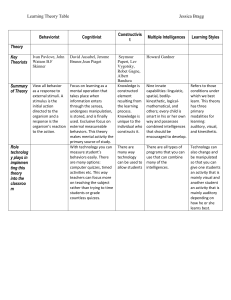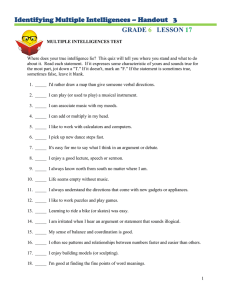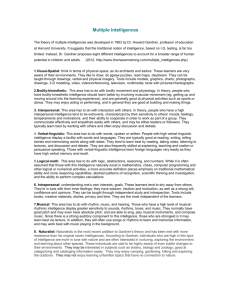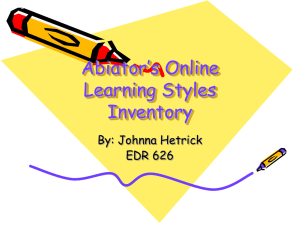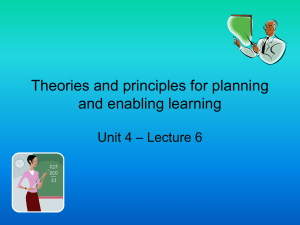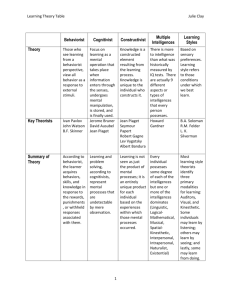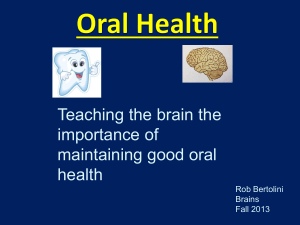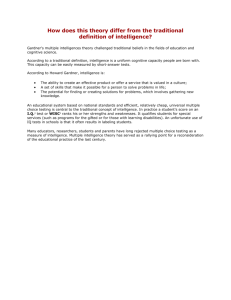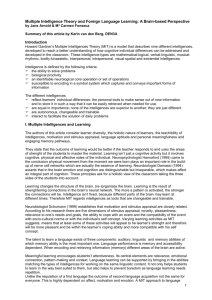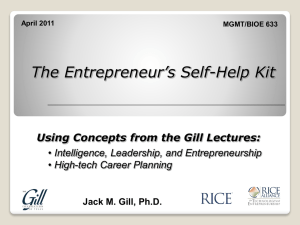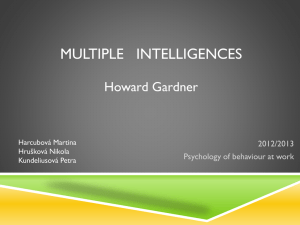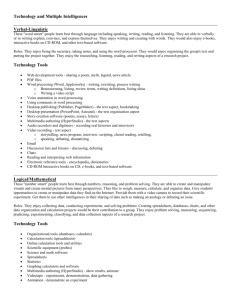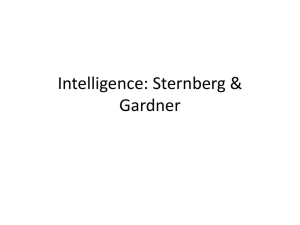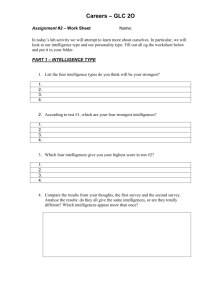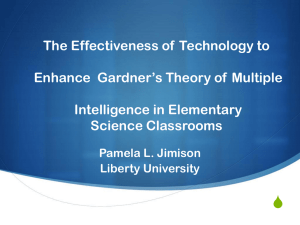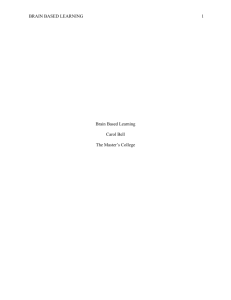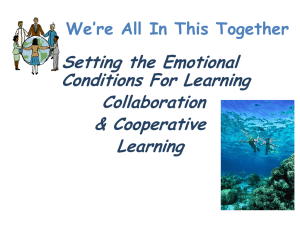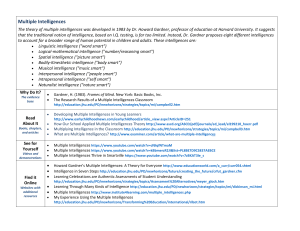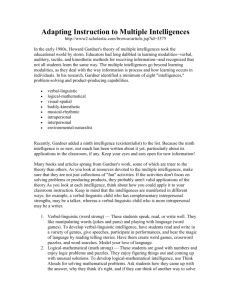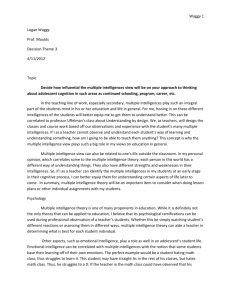MULTIPLE INTELLIGENCES test MULTIPLE INTELLIGENCES The
advertisement
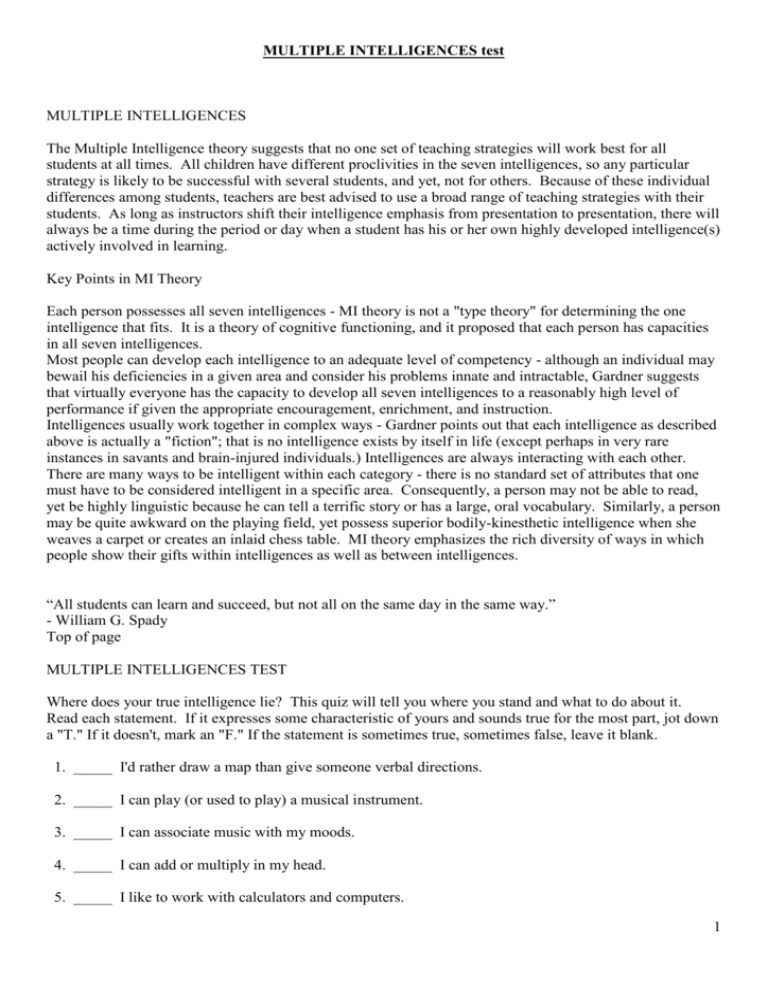
MULTIPLE INTELLIGENCES test MULTIPLE INTELLIGENCES The Multiple Intelligence theory suggests that no one set of teaching strategies will work best for all students at all times. All children have different proclivities in the seven intelligences, so any particular strategy is likely to be successful with several students, and yet, not for others. Because of these individual differences among students, teachers are best advised to use a broad range of teaching strategies with their students. As long as instructors shift their intelligence emphasis from presentation to presentation, there will always be a time during the period or day when a student has his or her own highly developed intelligence(s) actively involved in learning. Key Points in MI Theory Each person possesses all seven intelligences - MI theory is not a "type theory" for determining the one intelligence that fits. It is a theory of cognitive functioning, and it proposed that each person has capacities in all seven intelligences. Most people can develop each intelligence to an adequate level of competency - although an individual may bewail his deficiencies in a given area and consider his problems innate and intractable, Gardner suggests that virtually everyone has the capacity to develop all seven intelligences to a reasonably high level of performance if given the appropriate encouragement, enrichment, and instruction. Intelligences usually work together in complex ways - Gardner points out that each intelligence as described above is actually a "fiction"; that is no intelligence exists by itself in life (except perhaps in very rare instances in savants and brain-injured individuals.) Intelligences are always interacting with each other. There are many ways to be intelligent within each category - there is no standard set of attributes that one must have to be considered intelligent in a specific area. Consequently, a person may not be able to read, yet be highly linguistic because he can tell a terrific story or has a large, oral vocabulary. Similarly, a person may be quite awkward on the playing field, yet possess superior bodily-kinesthetic intelligence when she weaves a carpet or creates an inlaid chess table. MI theory emphasizes the rich diversity of ways in which people show their gifts within intelligences as well as between intelligences. “All students can learn and succeed, but not all on the same day in the same way.” - William G. Spady Top of page MULTIPLE INTELLIGENCES TEST Where does your true intelligence lie? This quiz will tell you where you stand and what to do about it. Read each statement. If it expresses some characteristic of yours and sounds true for the most part, jot down a "T." If it doesn't, mark an "F." If the statement is sometimes true, sometimes false, leave it blank. 1. _____ I'd rather draw a map than give someone verbal directions. 2. _____ I can play (or used to play) a musical instrument. 3. _____ I can associate music with my moods. 4. _____ I can add or multiply in my head. 5. _____ I like to work with calculators and computers. 1 6. _____ I pick up new dance steps fast. 7. _____ It's easy for me to say what I think in an argument or debate. 8. _____ I enjoy a good lecture, speech or sermon. 9. _____ I always know north from south no matter where I am. 10. _____ Life seems empty without music. 11. _____ I always understand the directions that come with new gadgets or appliances. 12. _____ I like to work puzzles and play games. 13. _____ Learning to ride a bike (or skates) was easy. 14. _____ I am irritated when I hear an argument or statement that sounds illogical. 15. _____ My sense of balance and coordination is good. 16. _____ I often see patterns and relationships between numbers faster and easier than others. 17. _____ I enjoy building models (or sculpting). 18. _____ I'm good at finding the fine points of word meanings. 19. _____ I can look at an object one way and see it sideways or backwards just as easily. 20. _____ I often connect a piece of music with some event in my life. 21. _____ I like to work with numbers and figures. 22. _____ Just looking at shapes of buildings and structures is pleasurable to me. 23. _____ I like to hum, whistle and sing in the shower or when I'm alone. 24. _____ I'm good at athletics. 25. _____ I'd like to study the structure and logic of languages. 26. _____ I'm usually aware of the expression on my face. 27. _____ I'm sensitive to the expressions on other people's faces. 28. _____ I stay "in touch" with my moods. I have no trouble identifying them. 29. _____ I am sensitive to the moods of others. 30. _____ I have a good sense of what others think of me. 2 MULTIPLE INTELLIGENCE SCORING SHEET Place a check mark by each item you marked as "true." Add your totals. A total of four in any of the categories A through E indicates strong ability. In categories F and G a score of one or more means you have abilities as well. Totals: A B C D E F G Linguistic LogicalMathematical M usical Spatial BodilyKinesthetic Intrapersonal Interpersonal 7 ___ 8 ___ 14___ 18 ___ 25 ___ 4 ___ 5 ___ 12 ___ 16 ___ 21 ___ 2 ___ 3 ___ 10 ___ 20 ___ 23 ___ 1 ___ 9 ___ 11___ 19___ 22___ 6 ___ 13 ___ 15 ___ 17 ___ 24 ___ 26 ___ 28 ___ 27 ___ 29 ___ 30 ___ ____ ____ ____ ____ ____ ____ ____ 3
